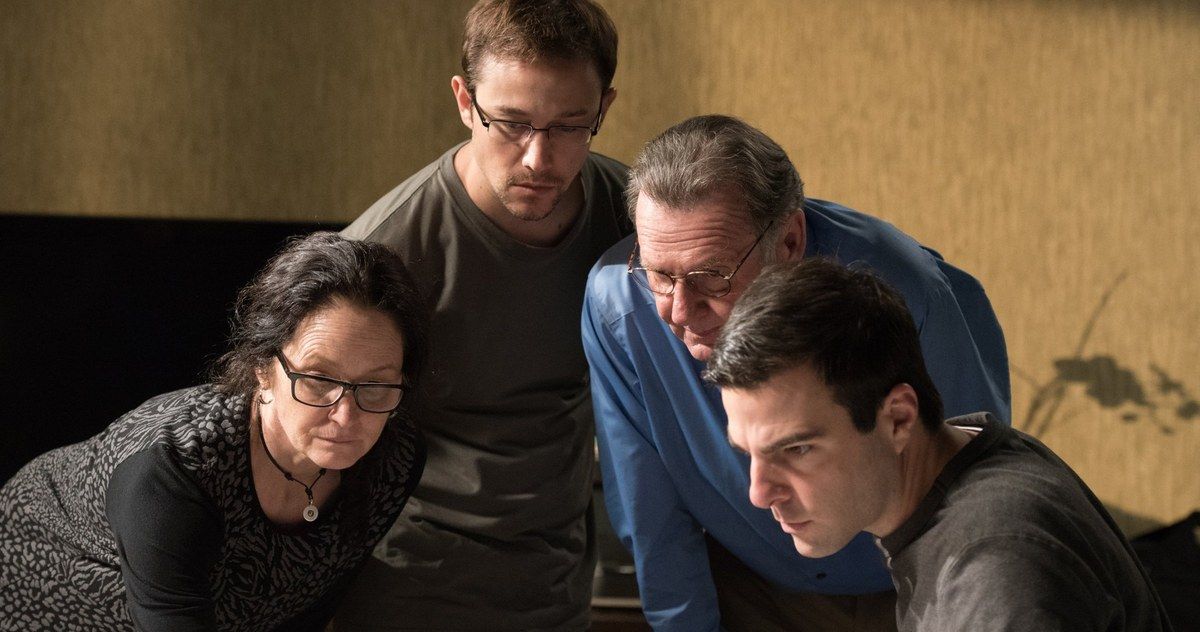Oliver Stone's dramatization of NSA whistleblower Edward Snowden humanizes him, but adds nothing new to the public discourse. The events regarding Snowden's flight from the US with a trove of top secret intelligence has already been told in Laura Poitras's Oscar winning documentary, Citizenfour. Snowden's greatest strength is the portrayal of the long relationship between Edward Snowden (Joseph Gordon-Levitt) and his girlfriend, Lindsay Mills (Shailene Woodley). Stone views Snowden as a hero. He depicts him as such, a noble American shedding light on the vast overreach of a government run amok. Others see Snowden as a traitor that endangered his country's intelligence apparatus. I'll leave politics out of this review and judge the film purely on its artistic merits.
The film opens with Edward Snowden in basic training. His stint in the army was cut short by a severe leg injury. Unsure of what to do next, Snowden followed his strength, computer programming and diehard patriotism. He ended up at the CIA, where his skills were recognized and groomed. During this period, the dry, bookish Edward Snowden meets the beautiful, free-spirited Lindsay Mills on a geek dating website. Their romance flourishes along with his career. Snowden and Mills move in together. She accompanies him on his assignments abroad. As Snowden moves up in the intelligence world, he becomes alarmed at the scope of the government's surveillance into the lives of ordinary citizens. He decides to take action. Stealing his beloved country's greatest secrets and clandestinely meeting with journalists in Hong Kong.
The US intelligence agencies are viewed through a fairly narrow scope. Snowden is alarmed by their capability and actions in collecting private data from ordinary citizens surreptitiously, without the consent of judicial review. He's mortified by the drone strikes that kill innocents along with their purported targets. The film dwells heavily on these scenes. What it does not do is show any circumstance where intelligence saved lives or thwarted terrorist attacks. It's an entirely skewed presentation. From watching Snowden, the audience would infer that the only thing intelligence agencies did is kill indiscriminately and snoop into your computer.
Oliver Stone portrays Snowden as the man who had it all. Then gave it up because he was morally obligated to. Snowden was stationed in paradise, made tons of money, had a loving relationship. Others before him that questioned authority through government channels were severely rebuked or criminally charged. He had no choice but to copy everything and make a run for it. It was his duty as a concerned citizen. Alas this is not a black and white world. Stone's view of Snowden's treasonous activities is romantic to say the least. Snowden, who by all means is hyper-intelligent and calculating, is never seen reasoning through his actions. He makes a bold move and the rest is history.
Coming from Open Road Films, the film shows the events in Hong Kong, but does not discuss how he ended up in Russia. Snowden's limbo in the Moscow airport mesmerized the world after he went public. It's strange to me that this time, along with how he was granted asylum is never depicted. This goes to the heart of what some consider to be Snowden's hypocrisy. Here is a man criticizing America's actions, while hiding out under the protection of the iron-fisted Vladimir Putin in Moscow. Snowden addresses this somewhat by saying his passport to South America had been rebuked by the US State Department. His critics aren't convinced.
In summary, Snowden is a love song. It doesn't view Edward Snowden in any critical light. It tells his story the way he and Oliver Stone want it to be told, and it's not clear how audiences will respond to that in terms of the movie's box office. The acting is good. Joseph Gordon-Levitt and Shailene Woodley are capable players as always. Snowden leaves a lot untouched. It has a point of view, speaks clearly to it, but is decidedly unbalanced otherwise. Edward Snowden did bring a great deal of change to the way government collects data on ordinary citizens. The question still remains if it was done the right way and how damaging the leak was to the US intelligence system.

